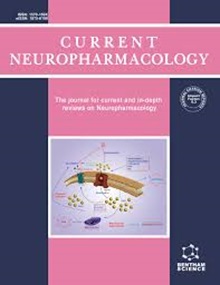Protective Role of Electroacupuncture Against Cognitive Impairment in Neurological Diseases
IF 4.8
2区 医学
Q1 NEUROSCIENCES
引用次数: 0
Abstract
: Many neurological diseases can lead to cognitive impairment in patients, which includes dementia and mild cognitive impairment and thus create a heavy burden both to their families and public health. Due to the limited effectiveness of medications in treating cognitive impairment, it is imperative to develop alternative treatments. Electroacupuncture (EA), a required method for Traditional Chinese Medicine, has the potential treatment of cognitive impairment. However, the molecular mechanisms involved have not been fully elucidated. Considering the current research status, preclinical literature published within the ten years until October 2022 was systematically searched through PubMed, Web of Science, MEDLINE, Ovid, and Embase. By reading the titles and abstracts, a total of 56 studies were initially included. It is concluded that EA can effectively ameliorate cognitive impairment in preclinical research of neurological diseases and induce potentially beneficial changes in molecular pathways, including Alzheimer’s disease, vascular cognitive impairment, chronic pain, and Parkinson’s disease. Moreover, EA exerts beneficial effects through the same or diverse mechanisms for different disease types, including but not limited to neuroinflammation, neuronal apoptosis, neurogenesis, synaptic plasticity, and autophagy. However, these findings raise further questions that need to be elucidated. Overall, EA therapy for cognitive impairment is an area with great promise, even though more research regarding its detailed mechanisms is warranted.电针对神经系统疾病认知障碍的保护作用
:许多神经系统疾病都会导致患者出现认知障碍,包括痴呆症和轻度认知障碍,从而给患者家庭和公共卫生造成沉重负担。由于药物治疗认知障碍的效果有限,开发替代疗法势在必行。电针(EA)作为传统中医的必备方法,具有治疗认知障碍的潜力。然而,其中的分子机制尚未完全阐明。考虑到目前的研究现状,我们通过PubMed、Web of Science、MEDLINE、Ovid和Embase系统地检索了截至2022年10月这十年间发表的临床前文献。通过阅读标题和摘要,共初步纳入了 56 项研究。结论是,在神经系统疾病的临床前研究中,EA 可有效改善认知障碍,并诱导分子通路发生潜在的有益变化,包括阿尔茨海默病、血管性认知障碍、慢性疼痛和帕金森病。此外,EA 通过相同或不同的机制对不同类型的疾病产生有益影响,包括但不限于神经炎症、神经元凋亡、神经发生、突触可塑性和自噬。然而,这些发现提出了更多的问题,需要进一步阐明。总之,EA疗法治疗认知障碍是一个前景广阔的领域,尽管还需要对其详细机制进行更多的研究。
本文章由计算机程序翻译,如有差异,请以英文原文为准。
求助全文
约1分钟内获得全文
求助全文
来源期刊

Current Neuropharmacology
医学-神经科学
CiteScore
8.70
自引率
1.90%
发文量
369
审稿时长
>12 weeks
期刊介绍:
Current Neuropharmacology aims to provide current, comprehensive/mini reviews and guest edited issues of all areas of neuropharmacology and related matters of neuroscience. The reviews cover the fields of molecular, cellular, and systems/behavioural aspects of neuropharmacology and neuroscience.
The journal serves as a comprehensive, multidisciplinary expert forum for neuropharmacologists and neuroscientists.
 求助内容:
求助内容: 应助结果提醒方式:
应助结果提醒方式:


